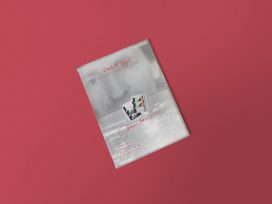
‘There are either heroes or enemies, with no in-between. There is no room for indulgence or softness – just demands, judgments and relentlessness.’ How war makes a taboo of pleasure and the erotic.
Boris Vezjak looks into Peter Handke’s controversial Nobel Prize using the analogy of a pizza: whether one should only care if it tastes good and not about the morals of the chef. Isolationists only refer to tastiness, while holists’ criticisms don’t necessarily invalidate the award.
This is not the first time the Nobel Prize for Literature has been awarded to a controversial author. In the case of Peter Handke, however, there have been widespread public polemics about whether it is appropriate or justified. The international public have closely followed the Handke case, especially in Slovenia. Handke’s Slovene mother was born in Austrian Carinthia, and the author has cultural and personal connections with Slovenia. Nobody is surprised by the formation of camps for and against the committee’s choice, nor the rage that comes with it. In Slovenia, they have clashed even more than elsewhere.
His supporters’ position is simple: even assuming Handke can be criticized for what he has said and done in the past, mostly to do with his defense of the genocidal Slobodan Milošević regime, this should not detract from the quality of his literary work. Handke hinted at this himself when he decided to cut off contact with journalists, declaring angrily that none of them knew anything about his writing.
While Handke’s defenders accuse others of envy and pathological contempt, his critics argued that, in deciding who deserves an award, the work cannot be separated from the person behind it: we must consider the author as part of a package and view it holistically. Taking this approach gives us no choice but to deny the award is justified, since its symbolic weight presupposes, however indirectly, the legitimacy of Handke’s tribute to the ‘Balkan executioners’. The Mothers of Srebrenica group followed this logic, requesting that the Swedish Academy’s Literature Committee withdraw the award. Similar outrage was expressed by PEN America and commentators worldwide.
Let’s call the first camp ‘isolationists’, since they believe that works of art (and science) should be evaluated on their own merits, independent of the artist. The other camp could be called ‘holists’, since they believe in the inseparability of the artist from their art. How compelling is each side’s reasoning?
Handke’s Slovenian supporters probably vouch for him because he is, in part, ‘theirs’. An analogy involving a pizza, meanwhile, explains the basic principle of the isolationist approach. When it is served to you, you only evaluate whether the pizza is good. Your judgment will in no way depend on the chef; you will not be interested in what he has done in the past, if he might have killed anyone, gives generously to charities, if he’s a gay activist or an outspoken homophobe, a human rights activist or an abortion opponent. Nor will you care about the colour of his skin or if he pays taxes. What counts here is how the pizza tastes — its appearance and intrinsic qualities, not the cook. A chef can be a bad person and still make great pizza, and a supremely virtuous one may even give us upset stomachs.
This illustrates how the separation of scientist/achievement and artist/art is inevitable, since we may know someone is a bad person but still be an outstanding artist or scientist. We will, therefore, not reject their work, just as it never occurs to us to reject a tantalizing Italian dish because of who made it. And, logically, the reverse is also true: someone may be virtuous and morally beyond reproach, yet, as an artist or scientist, have nothing to show for themselves. Therefore, we should not in any way ‘confuse’ our views of that person with our judgments, positions, and decisions as to whether they deserve an award or not.
Another question could ask why we assume there is a correlation between the two. This is probably because of models of virtue ethics, dominant in moral thought since antiquity, according to which only good people do good deeds and only bad people do bad things. Handke’s isolationist defenders argue for exactly this kind of ‘pizza-style’ art. We do not know how far they are prepared to go in this respect, or if they would think a work of art could still be ‘good’ if, for example, the artist were to justify crimes in their works. This is probably not the same as a case in which an otherwise delicious pizza would become morally unappetizing if the chef spelt out a politically repugnant idea in tomato paste.
Handke’s critics may disagree with the basic isolationist principle, but what counts as a ‘holistic’ and how far it goes is debatable. The holists would not necessarily say that Handke’s oeuvre is bad because it was written by a ‘bad person’ since, alongside the belief that the author does not deserve the prize, the critic readily acknowledges that the work itself has full artistic quality. The vast majority of holistic critics do not dispute this. The problem comes down to the legitimation of his political views, which inevitably comes with the award. The only thing at issue is the fact that, as a society, we celebrate a writer who has done and said controversial things.
If that is so, then the dilemma lies on the isolationist’s side. To justify the Nobel Prize, he can and must only use the pizza argument, but doing so misses the critics’ point, since the isolationist can only repeat that it is ‘savoury’ and ‘delicious’. The legitimation question is completely avoided. In similar cases, isolationists are ordinary pure lovers of literature, who may even believe that artistic truth is transcendent in nature and independent of the observer and even the author. If they generally believe that good literature does not depend on whether the writer is a good person or not, this belief might be attributed more to the holist, though this is by no means necessary.
The isolationist’s dilemma becomes even greater because they are forced to defend the justification of the award even if the recipient was a war criminal rotting in prison; it is difficult to tolerate intermediate possibilities if this position is taken. If we make the art/artist separation, we are compelled to do so in every case. The holist, meanwhile, is in a better position here, since a ‘holistic’ view does not close any doors and they can consider the specific circumstances evaluating both aspects together. When, at the time of the award, Handke was accused of domestic violence by his ex-partner Marie Colbin, the holist might say that neither this repugnant act nor his defence of war crimes inherently invalidate the justification of the award.
Personally, I think Handke crossed a line. This does not, however, make him any less of an outstanding author. I would not give him the highest award in the world because I think that would be a symbolic recognition of him as a person. There are plenty of other examples of morally dubious figures whose works still command our respect. I do not think Heidegger’s defense of the Nazis should be completely ignored, but neither should we feel obligated to reject his philosophy because of it. The Caravaggio scholar will have to deal with the information that the artist killed someone, but this will not make his paintings any less magnificent; the art historian will have to consider such life circumstances. Knut Hamsun’s flirtations with Nazism should not turn the isolationist away from his Nobel Prize, although there has been no dilemma in this case since he received it in 1920.
Some different, though parallel, controversies open up around literary perception. To what extent are our literary, aesthetic, musical, artistic, or other experiences influenced by our knowledge of the author when this is socially or personally disturbing? Does Van Gogh’s mental illness make us view his works any differently? How is reading Norman Mailer changed by the fact that he stabbed his wife? Is our listening pleasure affected by the information that David Bowie had sex with underage ‘partners’? Do we experience something similar when watching the films of Roman Polansky or Woody Allen? Are any of these experiences changed retroactively?
Something similar applies to the case of Peter Handke. An isolated view of artistic creation is probably not possible. The only question is where we draw the line in our judgments.
This article was written before the 2019 Nobel Prize award ceremony on 10 December.
Published 30 December 2019
Original in English
Translated by
Jean McCollister
First published by Dialogi 10/2019
Contributed by Dialogi © Boris Vezjak / Jean McCollister / Dialogi / Eurozine
PDF/PRINTSubscribe to know what’s worth thinking about.

‘There are either heroes or enemies, with no in-between. There is no room for indulgence or softness – just demands, judgments and relentlessness.’ How war makes a taboo of pleasure and the erotic.

On the documentary poetry of Jonas Mekas; multi-voiced personalism as literary genre; and the history of the Fens as ecological morality tale.